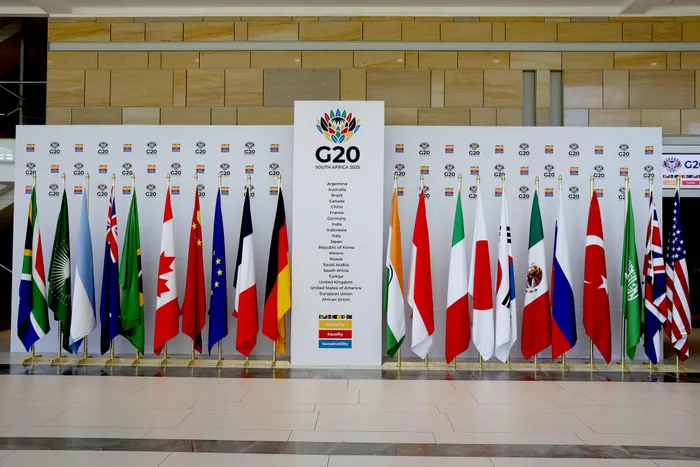How North West's G20 strategy aims to boost tourism and job creation
Opinion

The Johannesburg global summit offers Africa's pivotal moment to rewrite its story. The North West delivered a declaration of intent: to harness local assets and align them with continental aspirations, fueling employment through tourism, innovation, youth empowerment, gender inclusion, and sustainability.
Image: Supplied
WHEN North West Province took the G20 stage, first at the Africa Investment Summit’s Academia–Public–Private–Diplomatic Corps Forum, then at the Mission 100 launch, it communicated more than policy.
It delivered a declaration of intent: to harness local assets and align them with continental aspirations, fueling employment through tourism, innovation, youth empowerment, gender inclusion, and sustainability. Yet the critical question remains: Can the G20 convert rhetoric into reality?
The province’s tourism-led job strategy is compelling. Iconic local attractions — Pilanesberg, Madikwe, the Vredefort Dome, Taung, and Bakgatla Cultural Village — are central to a vision of eco- and heritage-tourism that is community-driven, not extractive.
Provincial officials underscored tourism as both a source of economic growth and social upliftment, dovetailing perfectly with Mission 100’s goal to attract 100 million tourists and generate 10 million jobs by 2030 under Agenda 2063.
Collaboration with academia bolsters this approach. A flagship partnership between the Department of Economic Development, Environment, Conservation and Tourism (Dedect) and Unisa aims to launch a Tourism Academy that equips youth and women with digital and entrepreneurial competencies adapted to the modern tourism economy.
This is not abstract theory — it is an applied workforce strategy, grounded in measurable outputs via the Triple Helix model of government, academia, and industry.
Central to all this is gender and youth inclusion. With over 50% of the province’s population under 35 and women significantly underrepresented in tourism leadership, North West’s proposal for a Mission 100 Gender Inclusion Fund is audacious and timely.
By leveraging Development Finance Institutions and private-sector capital, the fund would offer targeted training, market access, and capital to women-led tourism startups, connecting directly to the G20’s stated emphasis on equitable growth.
Sustainability ties the vision together. The province’s agenda includes gas-to-power pilot projects, land rehabilitation programmes, renewable energy integration, and incubators for community-rooted, low-carbon tourism. These initiatives position North West as a cradle for green-job creation that is both environmentally responsible and economically empowering.
On paper, this blueprint aligns with South Africa’s foreign policy priorities and the G20’s Africa-focused presidency. With the country committed to multipolarity, equity, and global justice, the 2024–25 G20 theme *Solidarity, Equality, Sustainability* resonates with North West’s developmental ethos.
G20 mechanisms such as the EU green investment framework and the Cost of Capital Commission are aligned with both provincial ambitions and the African Union’s Agenda 2063. These tools offer credible opportunities to mobilise resources through cooperation, not dependency.
South Africa’s commitment to inclusive growth and cooperative multilateralism remains unwavering. While global disagreements are inevitable in times of economic strain, our responsibility at the provincial and national level is to ensure that the benefits of the G20 extend beyond negotiation tables and into the lives of our people.
North West has embraced this opportunity to showcase not only our economic potential but also the resilience of our communities. The lessons we draw from this moment are clear: leadership must remain rooted in service, partnerships, and accountability.
Premier Lazarus Mokgotsi affirmed: “The opportunity to be awarded the right to host these meetings came at the right time, aligning with our ongoing programme to build strategic infrastructure projects in support of our tourism drive. We have invested twenty-five million rand in refurbishing the Pilanesberg Airport to accommodate the growing tourist numbers in the Bojanala, Sun City, and Pilanesberg nodal point.”
While global debt reform remains unfinished, North West is positioning itself to seize the opportunity, not to echo complaints. UN Secretary-General António Guterres’s call for a new collective debt relief mechanism — akin to HIPC — resonates, but the province is not waiting idly.
I believe the provincial job-creation programmes will be aligned with both national fiscal planning and continental financing instruments, ensuring that policy ambition is paired with financial realism.
Indeed, voices questioning the province’s positioning often overlook the geopolitical complexity of the G20. With new power centres emerging, the context remains fluid. But South Africa’s role, anchored in the African Union, BRICS, and Sadc, offers a unique platform for provinces like North West to translate national foreign policy into local outcomes. Rather than succumbing to binary narratives of East versus West, the province is building flexible coalitions that prioritise youth employment, innovation, and inclusive growth.
For North West’s vision to become a reality, four concrete actions are being explored. First, targeted funding for eco-tourism, digital skills academies, and women-led SMEs must be ring-fenced and scaled. Second, debt reform at the G20 level must prioritise fiscal space for job-creating sectors. Third, transparent tracking of investment flows must be enforced to build public trust. Lastly, partnerships through the African Union (AU) and regional DFIs should be leveraged to localise global capital and expertise.
North West’s presence at the G20 was not ceremonial; it was strategic. It offered a practical provincial blueprint that mirrors South Africa’s multi-polar diplomatic stance and supports the Global South’s pursuit of balanced development.
For the G20 to answer Africa’s call, its members must choose to lead, not lecture. If they do, provinces like North West won’t just host summits; they’ll host solutions.
* Bitsa Lenkopane is the MEC for Economic Development, Environment, Conservation and Tourism in North West.
** The views expressed here do not reflect those of the Sunday Independent, IOL, or Independent Media.